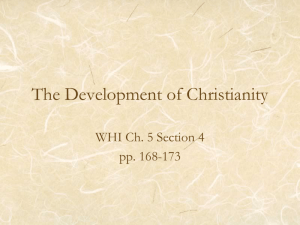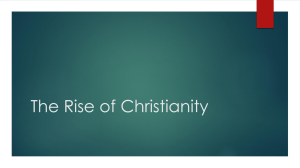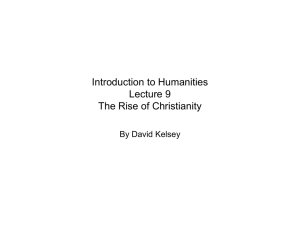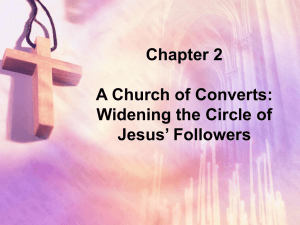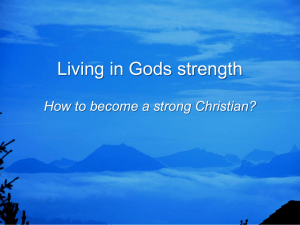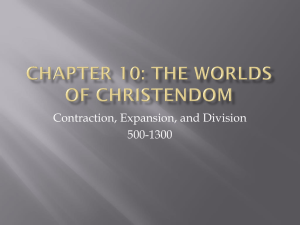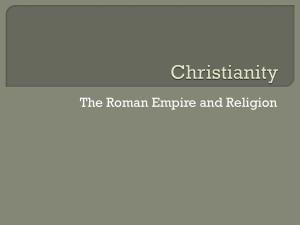The_Development_of_Christianity
advertisement
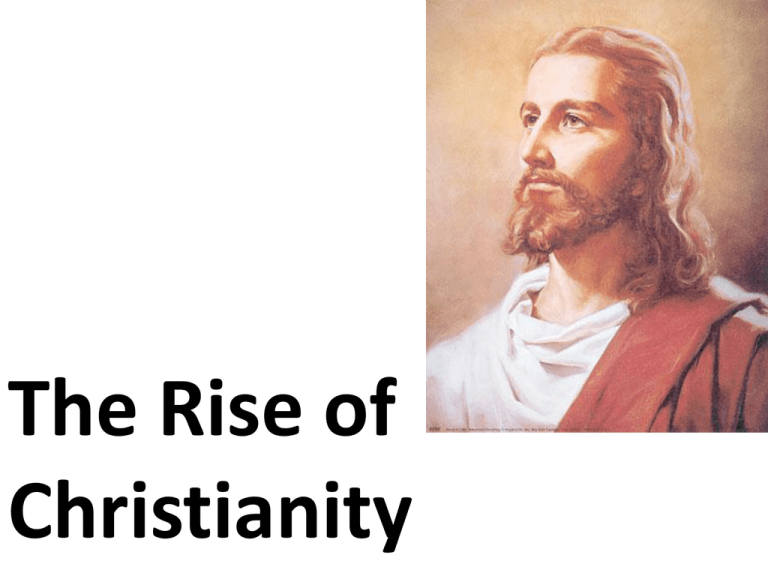
The Rise of Christianity • The rise of Christianity marks a fundamental break with the dominant values of the GrecoRoman world. Christian view of God, human beings, and the world were quite different from those of the Greeks and Romans. The Religious Environment of the Roman World • The official state religion of Rome focused on the worship of a pantheon of gods and goddesses, including Jupiter(Zeus), Juno(Hera), Minerva(Athene), and Mars(Ares). As Rome developed and came into contact with other peoples and gods, the community simply adopted new deities. Greek Hermes Tolerant of other beliefs • By the end of third century, the Greek and Roman religions were completely amalgamated. The polytheistic Romans were extremely tolerant of other religions, and allowed the worship of native gods and goddesses and adopted some of the local gods. The appeal of Mystery Religions • An entry into a higher world of reality and the promise of a future life superior to the present one; • Elaborate rituals with deep emotional appeal: achieve communion with spiritual beings and undergo purification that opened the door to life after death. Mithraism 密特拉教 • Worship of Mithras: chief agent of Ahuramazda, the ‘Wise Lord’, the supreme god of light in Persian Zoroastrianism. Mithraist Practices • Mithras: the Roman sun god, “the Unconquered Sun”, patron deity of soldiers; • Paid homage to the sun on the first day of the week (Sunday), commemorated the sun’s birthday around December 25, and celebrated ceremonial meals. (parallels in Christianity) The Jewish Background • Divisions among the Jews: • The Sadducees(撒都该派): rigid adherence to Hebrew law, reject personal immortality, copt with Romans; • The Pharisees(法利赛派):strict adherence to Jewish ritual, rebel against Romans; • The Essences(艾赛尼 派):awaited a Messiah to save Israel from oppression, usher in the Kingdom of God; • The Zealots(吉拉德派):militant extremists advocating violent overthrow of Roman rule. Political Situation • The Zealots were extreme in their hope to expel the Romans by force, and their activities led to two disastrous revolts: • The destruction of the Jewish Temple at Jerusalem by the avenging Romans between 66 and 70 C.E.. • The destruction of the city of Jerusalem and the expulsion of its entire Jewish population in 132 -135 C. E.. The Story of Jesus • Jesus of Nazareth (c. 6 B.C. – 29 A.D.) was born to a Galilean Jewish family (not precisely in “year one”), and began public preaching around 30 years of age, esp. among the militant Zealots. • Jesus Christ(耶稣基督):“耶稣”源自 希伯来文 Yeshua,意思是“上帝拯救” ;“基督”源自希腊文 Messiah,意思是 “弥赛亚”。“基督”不是姓氏,而是 头衔。在希伯来语中,“弥赛亚”是“ 受膏者”,“上帝选中的王”,“上帝 所指定的以色列王”。所以,“耶稣基 督”的真实意思是“耶稣是基督”;“ 耶稣是救世主”。12月25日是指定的耶 稣诞辰庆祝日,但不是他真正的生日。 Not to undermine the tradition • “Do not think I have come to abolish the Law or the Prophets; I have not come to abolish them but to fulfill them.” The transformation of the inner person • “So in everything, do to others what you would have them do to you, for this sums up the Law and the Prophets.” • “Love the Lord your God with all your heart and with all your soul and with all your mind and with all your strength. The second is this: Love your neighbor as yourself.” The Sermon on the Mount • He presented the ethical concepts: humility, charity, brotherly love, and a belief in the inner being and a spiritual kingdom superior to this material world. This is the basis for the value system of medieval Western civilization, but not of the classical Greco-Roman civilization. • And seeing the multitudes, He went up on a mountain, and when He was seated His disciples came to Him. Then He opened His mouth and taught them, saying: • "Blessed are the poor in spirit, For theirs is the kingdom of heaven. • Blessed are those who mourn, For they shall be comforted. • Blessed are the meek, For they shall inherit the earth. • Blessed are those who hunger and thirst for righteousness, For they shall be filled. • Blessed are the merciful, For they shall obtain mercy. • Blessed are the pure in heart, For they shall see God. • Blessed are the peacemakers, For they shall be called sons of God. • Blessed are those who are persecuted for righteousness' sake, For theirs is the kingdom of heaven. Blessed are you when they revile and persecute you, and say all kinds of evil against you falsely for My sake. Rejoice and be exceedingly glad, for great is your reward in heaven, for so they persecuted the prophets who were before you. -- Gospel according to Matthew • You have heard that it was said, “Eye for eye, and tooth for tooth.” But I tell you, Do not resist an evil person. If someone strikes you on the right cheek, turn to him the other also …… • You have heard that it was said, “Love your neighbor, and hate your enemy.” But I tell you, Love your enemies and pray for those who persecute you …… • Do not store up for yourselves treasures on earth, where moth and rust destroy, and where thieves break in and steal. But store up for yourselves treasures in heaven, where moth and rust do not destroy, and where thieves do not break in and steal. For where your treasure is, there your heart will be also … … • No one can serve two masters. Either he will hate the one and love the other, or he will be devoted to the one and despise the other. you cannot serve both God and Money. • Therefore I tell you, do not worry about your life, what you will eat or drink; or about your body, what you will wear. Is not life more important than food, and the body more important than clothes? • Look at the birds of the air; they do not sow or reap to store away in barns, and yet your heavenly Father feeds them. Are you not much more valuable than they? … So do not worry, saying, What shall we eat? or What shall we drink? or What shall we wear? For the pagans run after all these things, and your heavenly Father knows that you need them. But seek first his kingdom and his righteousness, and all these things will be given to you as well. • My kingdom is not of this world. • 于是,他由于宣 布天国不是现在 的王国而得罪了 激进派;由于宣 布自己是救世主 而得罪了犹太保 守派;由于有众 多的追随者而给 罗马帝国造成了 威胁,所以他被 Pontius Pilate判处 有罪。 • Offending the Roman authorities and the radical Zealots, Jesus found himself crucified on the Cross. • 耶稣所受的刑罚 是鞭打和钉十字 架。按照犹太法 律,鞭打犯人的 次数不许超过40 下,所以一般只 打39下,以示仁 慈。但罗马法对 鞭打的次数和程 度没有限制,以 致耶稣被鞭打得 极度孱弱,背不 动十字架了,死 在了骷髅地。 • But a few loyal followers of Jesus spread the story that Jesus had been resurrected and had then ascended into heaven. • Peter, one of the disciples of Jesus, founded the Christian church at Rome. Paul of Tarsus(c.5—c.67) • 圣保罗,史称“基督教的第二创 建者”,提出基督实际上是救世 主-上帝,是上帝之子,来到尘世 是为了拯救由于亚当的原罪而犯 罪的终生。他用自己的死换来众 生的救赎,使得信众能够重新开 始个人的救赎。接受耶稣基督为 救世主,信众就能得救。这是基 督教的基本信条。 • Paul had written a series of letters, or epistles, outlining Christian beliefs for different Christian communities. • The Gospels, the “good news” concerning Jesus’ life and teachings and formed the core of the New Testament, the Christian Bible. • The Roman roads helped spread the “good news”, and therefore the rise of Christianity. Changing attitudes toward Christianity • Harmful to the order of Roman state: 1. held secret meetings, connected to Christian groups in other areas; 2. overly exclusive and harmful to the community and public order; 3. did not recognize other gods; 4. refused to participate in the worship of the state gods and imperial cult. • Persecution of the Christians began during the reign of Nero. 始于公元一、二世纪的 对基督徒的迫害非但 没有阻止基督教的发 展,反而使其在第二 和第三世纪壮大为具 有中央集权的宗教组 织,主教的作用随之 越来越重要,建立了 工薪制的僧侣等级结 构,基督教教会已经 林立于罗马帝国制下 的大中城市。 • In the fourth century, Christianity flourished after Constantine became the first Christian emperor. • Under Theodosius “the Great”(378-395), Christianity was made the official religion of the Roman Empire. Reasons for the triumph of Christianity • The Christian message had much to offer the Roman world: salvation appeals to a world full of suffering and injustice. • Christianity was not entirely unfamiliar: only another mystery eastern religion offering immortality by the sacrificial death of a savior-God. • Christianity had universal appeal: not restricted to men as in Mithraism. • It did not require a painful or expensive initiation rite: simply by baptism – a purification by water. • It gave new meaning to life: a personal relationship with God and a link to higher worlds. • It fulfilled the human need to belong: communities bounded people together by love, offering help to the poor, the sick, widows, and orphans. • It was attractive to all classes: the promise of eternal life for all – rich, poor, aristocrats, slaves, men and women.
